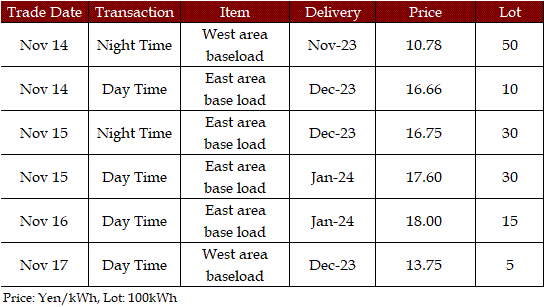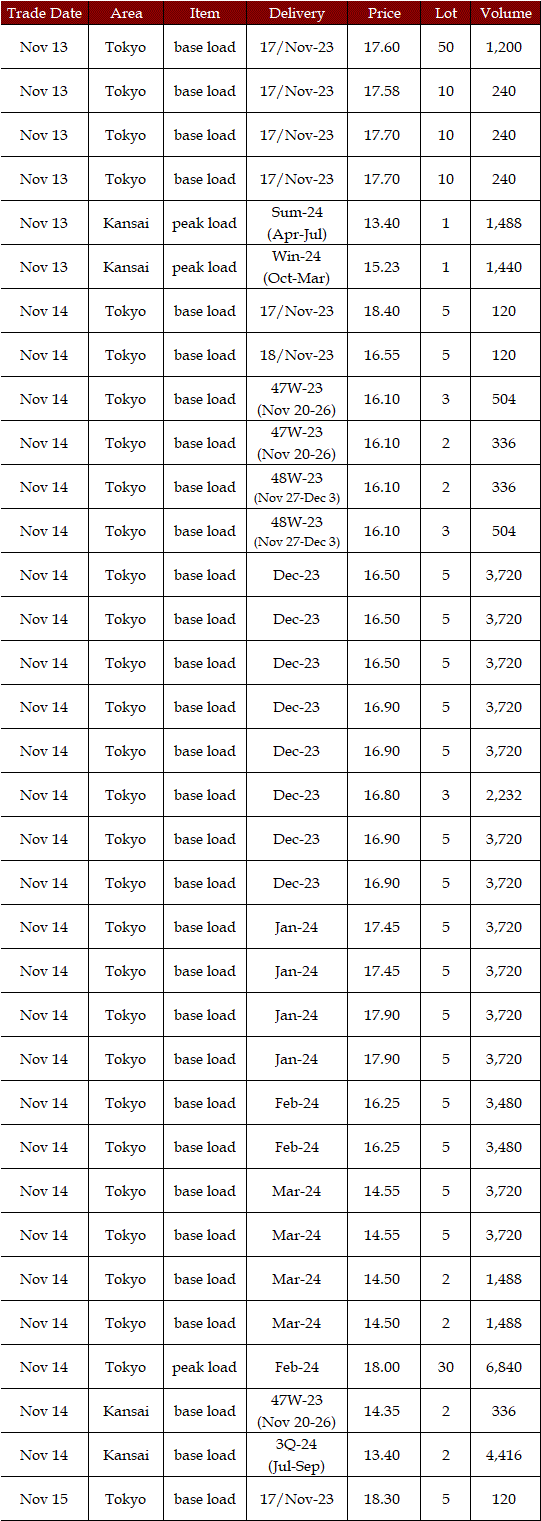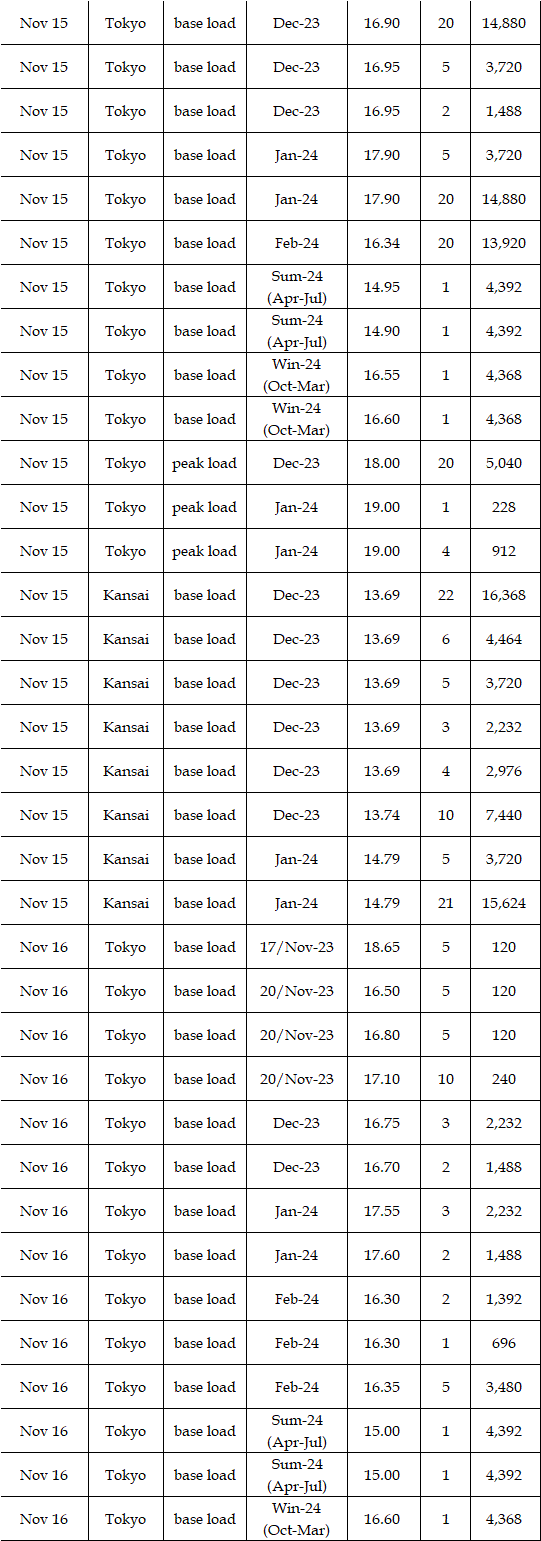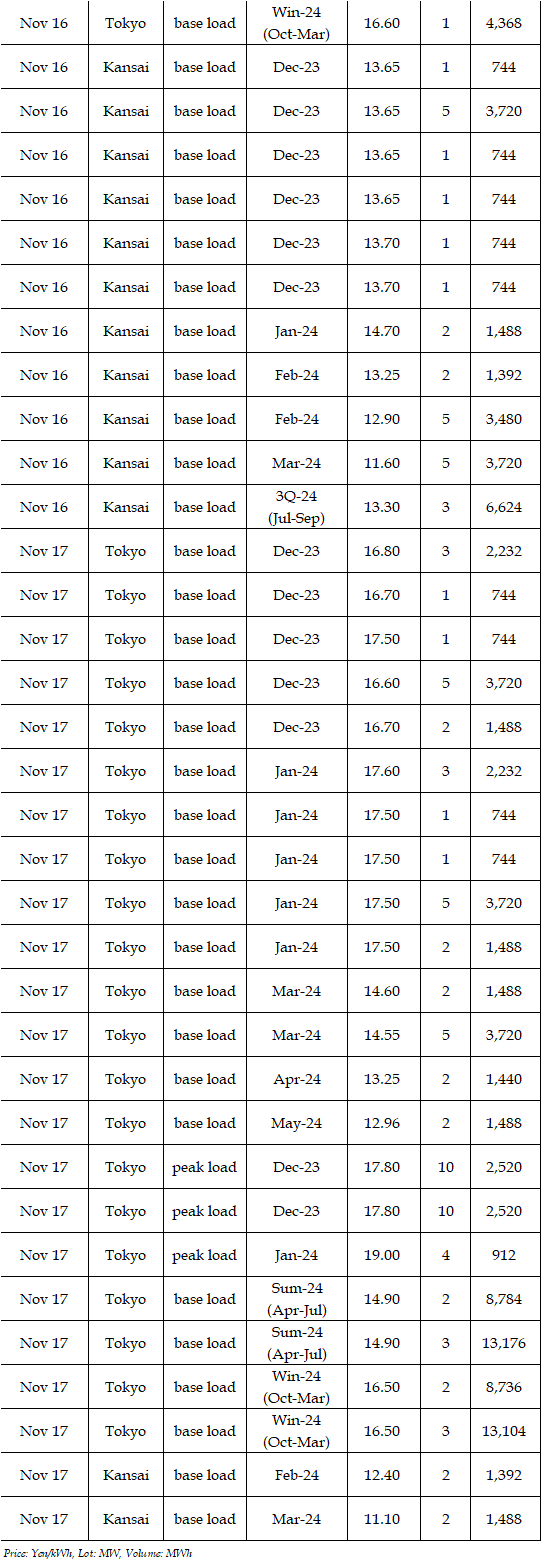|
In the day-ahead market on JEPX (Japan Electric Power Exchange), the 24-hour spot power prices on a weekly average basis for Nov 13-17 delivery softened from the previous week in East Japan but stretched rises in West Japan. The overall weakness in East Japan came as steep falls in Hokkaido and Tohoku more than offset a gain in Tokyo. Maintenance works at the Soma-Futaba Line connecting Tohoku and Tokyo caused heavy price decoupling at the Tohoku-Tokyo border day after day, creating an overhang in Tohoku and boosting downside pressure in Tohoku as well as Hokkaido. On the contrary, Tokyo turned higher with a shrinking inflow of low-priced power supply from Tohoku. In West Japan, spot prices from Hokuriku to Kyushu accelerated the rally after price decoupling at the Chubu-Kansai and Chugoku-Kyushu borders shrank from the previous week. Besides that, chilly climate throughout the week boosted demand and lent support to spot prices.
In Tokyo and Kansai, the key areas in East Japan and West Japan, the 24-hour average posted a difference in favor of the East by Yen 3.24 for Nov 13 delivery, Yen 1.32 for Nov 14 delivery, Yen 1.78 for Nov 15 delivery, Yen 0.89 for Nov 16 delivery, and Yen 4.43 for Nov 17 delivery.
In the fuel markets, LNG prices climbed up from the end of the previous week. Crude oil prices lost ground while coal prices remained almost stable.
DES Northeast Asia spot LNG prices hovered in the mid $16 level per mmBtu for prompt January 2024 arrival as of the latter half of the week (Nov 16), compared with the mid $15 level as of the end of the previous week (Nov 10). The strength came as European traders beefed up buybacks on the growing demand outlook for the winter period. European natural gas prices firmed up in the first half of the week, but turned softer in the latter half of the week. The Ministry of Economy, Trade and Industry (METI) announced on Nov 15 that Japan's LNG inventories for power generation grew to 2.42 mil mt as of Nov 12, up 50,000mt from 2.37 mil mt in the previous week. The growth came as power utilities speeded up stockpiling for the winter period. The level compared with 2.55 mil mt as of end-November last year and the average of past five years at 2.12 mil mt.
FOB Newcastle thermal coal prices in Australia hovered in the low $128 level for January 2024 loading as of the latter half of the week. The level was down moderately from the mid $129 level as of the end of the previous week. The market stayed in a limited range amid the continued absence of fresh incentives.
In the crude oil market, WTI crude for December 2023 stood at slightly above $73 as of afternoon on Nov 17 while Brent crude for January 2024 was trading in the mid $77 level. Both WTI and Brent tumbled by nearly $4 from the end of the previous week. Crude futures were outpaced by selling as a series of US economic indexes released from Nov 13 onward failed to meet market expectations, raising the dim outlook for the economy and concerns over a slowdown in crude oil demand. A buildup in US crude oil inventories also weighed on the market.
The actual highest price during the week was at Yen 25.83 in Tokyo for Nov 17 delivery. Meanwhile, the actual lowest price during the week was at Yen 0.01 in Hokkaido, Tohoku, Kyushu for Nov 13 delivery and Kyushu for Nov 14-15 delivery.
By area, the weekly average of the 24-hour spot prices was at Yen 10.19 in Hokkaido and Tohoku, down Yen 3.82 from the previous week, Yen 17.73 in Tokyo, up Yen 1.15, Yen 15.78 in Chubu, up Yen 0.61, Yen 15.40 in four areas including Hokuriku, Kansai, Chugoku and Shikoku, up Yen 3.37, and Yen 14.41 in Kyushu, up Yen 2.92.
In the JEPX auction, volumes of offers were 842.78 mil kWh on a weekly average basis, down 10.0% from the previous week. Meanwhile, bids on a weekly average basis expanded by 10.0% to 838.46 mil kWh. The weekly average of trade volumes grew by 2.3% to 613.30 mil kWh.
Power demand in nine areas of Japan during Nov 13-17 was a combined 11,566.53 mil kWh, up 8.8% from 10,626.58 mil kWh during Nov 6-10. The figure was up 2.1% from the corresponding period a year earlier. Demand during Nov 14-18, 2022 after day of week adjustment was 11,331.76 mil kWh.
In the JEPX forward market, no deals were confirmed during Nov 13-17.
Deals reported on TOCOM (Tokyo Commodity Exchange) during Nov 13-17 were as below.

Deals reported on EEX (European Energy Exchange) during Nov 13-17 were as below.



In the fourth week of November, spot prices will have even limited upside room compared with the third week. The highest temperature from Kyushu to southern Tohoku is forecast to stay around 20 degrees amid relatively comfortable climate while most areas are expected to have sunshine except the Japan Sea side in North Japan and Hokuriku. As a result, supply-demand fundamentals are believed to loosen up and give a negative impact on spot prices. Meanwhile, the Soma-Futaba Line is scheduled to undergo maintenance works, so that Hokkaido and Tohoku are likely to post outstanding weakness compared with other areas.

|







